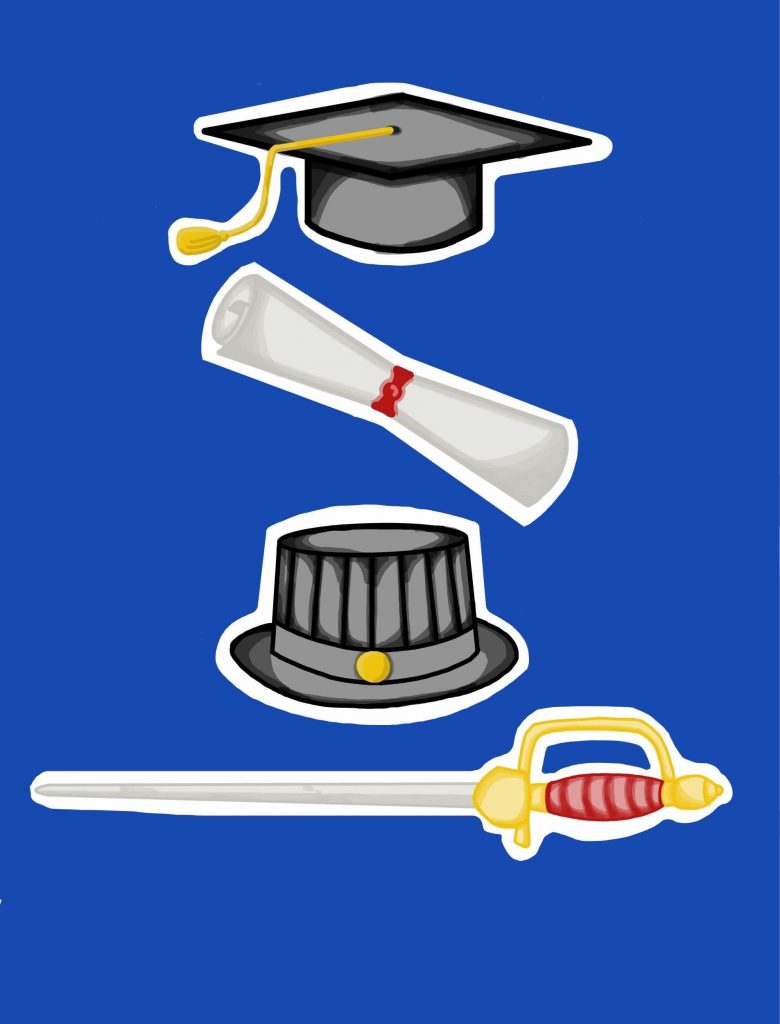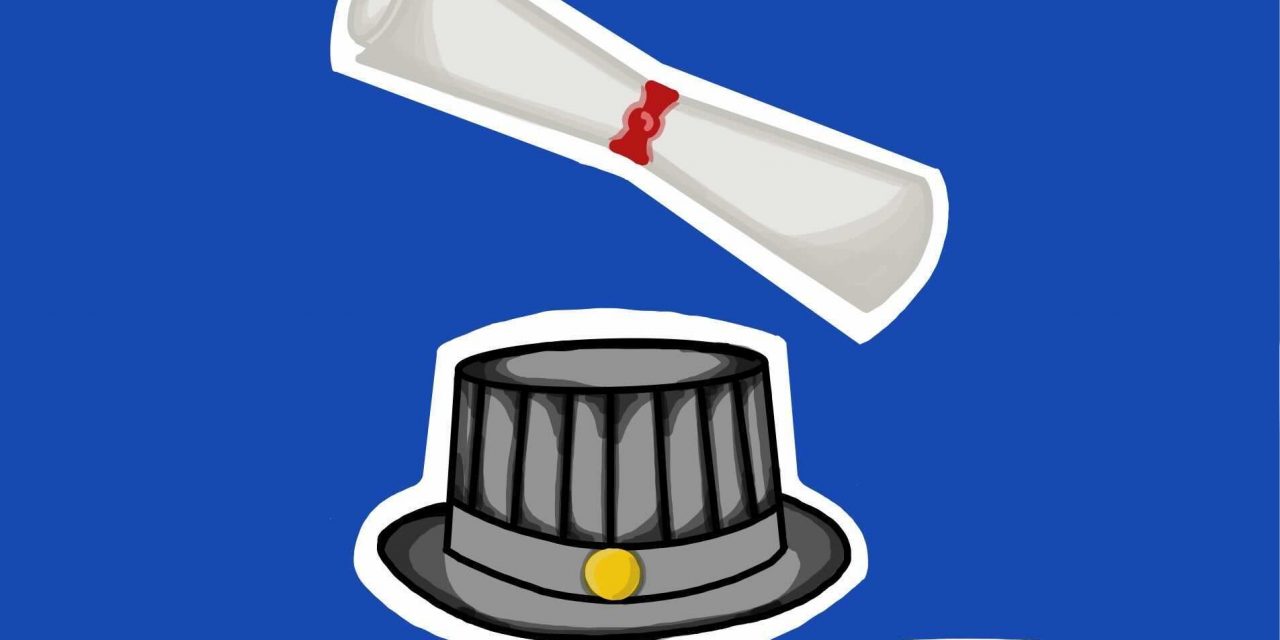
Graphic by Alison Barlow, Contributing Illustrator.
From pelting graduates with ketchup in Argentina to parading around town in the back of a pickup truck in Sweden, there are special traditions, dress attire and customs that mark graduation day. But let’s not deceive ourselves; what we actually look forward to is rubbing our fingers along the engraved name of our school on the diploma cover. A diploma in our hands signifies completion. It wasn’t until my middle school graduation that I realized how ridiculous graduation was — going through all these steps just for a piece of paper with my name on it.
So, what does a diploma mean? Nothing, really. It’s merely a certificate of achievement. In reality, it is not even the diploma that is valuable, but its accompanying idea: living proof of qualifications in a particular subject or field of study. It symbolizes sentimental value, but is also a constant reminder of the hefty tuition you paid for a piece of paper. But perhaps the pricelessness of education and knowledge makes up for that.
In the 2018-19 year, Emory awarded 4,930 degrees that all look exactly the same, disregarding the name of your degree. Diplomas are essentially unimpressive and meaningless, especially when we consider the ease of forgery in today’s digital age.
Obtaining an education is often at the forefront of social progress: students develop valuable skills they hopefully carry for the rest of their lives. Thus, despite constant complaints about homework and lack of consistent sleep schedules, everyone still trudges forward, waiting for graduation day. It seems almost insulting that diplomas can be easily counterfeit and mass printed to suit customer needs. In fact, in today’s digital age, The Diploma Company prides itself as the “Internet’s most trusted supplier of professionally printed fake degrees.” Despite grounds for criminal charges of fraud, the simplicity and potential to do so gives rise to security concerns and imminent value of diplomas as a way of testing one’s credibility and qualifications.
Though the Diploma Company does create fake credentials, many customers who use the Diploma Company also provide photographs of real degrees, asking for a replica to keep their original in safekeeping. People cherish sentimentality. We constantly attach meaning to objects. I would like that quintessential mantelpiece that reminds me that even though I struggled, I still made it through. We can’t simply remove the diploma from society. We need a replacement that is harder to replicate and able to retain sentimental value.
Diplomas are traditionally given to students at the conclusion of their education — whether in kindergarten or college — and is a milestone that symbolizes a beginning and end of a chapter of students’ lives. Though its purpose and significance varies, the cream-colored paper with blackletter typeface is proof of academic achievement. A diploma bears an extraordinary, almost laughable level of significance. Yes, a piece of paper is nice, but I want something more worthy. We deserve something commensurate with those all-nighters, countless cups of coffee and 2 a.m. cramming sessions.
In Finland, new PhD holders are given a PhD sword and hat during their Conferment Ceremony. Though the swords and hats vary by university and discipline, the general meanings of both are similar. The hat, akin to a top hat with a rounded top, is “a symbol of liberty… of scholarship and freedom of research.” On the other hand, the sword is “a symbol for the scientist’s fight for what he or she, in rigorous research, has found to be good, right and true.” Similarly, in Poland and Ukraine, doctoral students carry a stylized baton, or a Bulawa, to signify their graduation status.
For the Finnish, their swords and hats are less about an end to education, but rather a testament to their endless pursuit of their passions. The garb encourages students to never stop learning and continue searching for what is right and true. Perhaps we desire to be unique and award students with engraved spears, symbolic of leadership and honor, or telescopes, to encourage students to be curious, skeptical and always questioning. The meaning of education is subjective to all who pass through the halls of academia. But whatever we replace the diploma with, we should promote the purpose of education and the values we hope to uphold, rather than wait for a piece of paper to gather dust on a mantle.
Imagine your graduation day: everyone donning tailcoats or suits, wearing a top hat on your head and a sword sheathed at your side. It will be the Instagram photo and the memorabilia that we continue to talk about, its symbols and sentiment that help us ascend toward the phrase, “education is power.” Let’s abolish diplomas and adopt the Finnish sword and hat.
Sophia Ling (24C) is from Carmel, Indiana.
Sophia Ling (she/her) (24C) is from Carmel, Indiana and double majoring in Political Science and Sociology. She wrote for the Current in Carmel. She also loves playing guitar and piano, cooking and swimming. In her free time, she learns new card tricks and practices typing faster.





